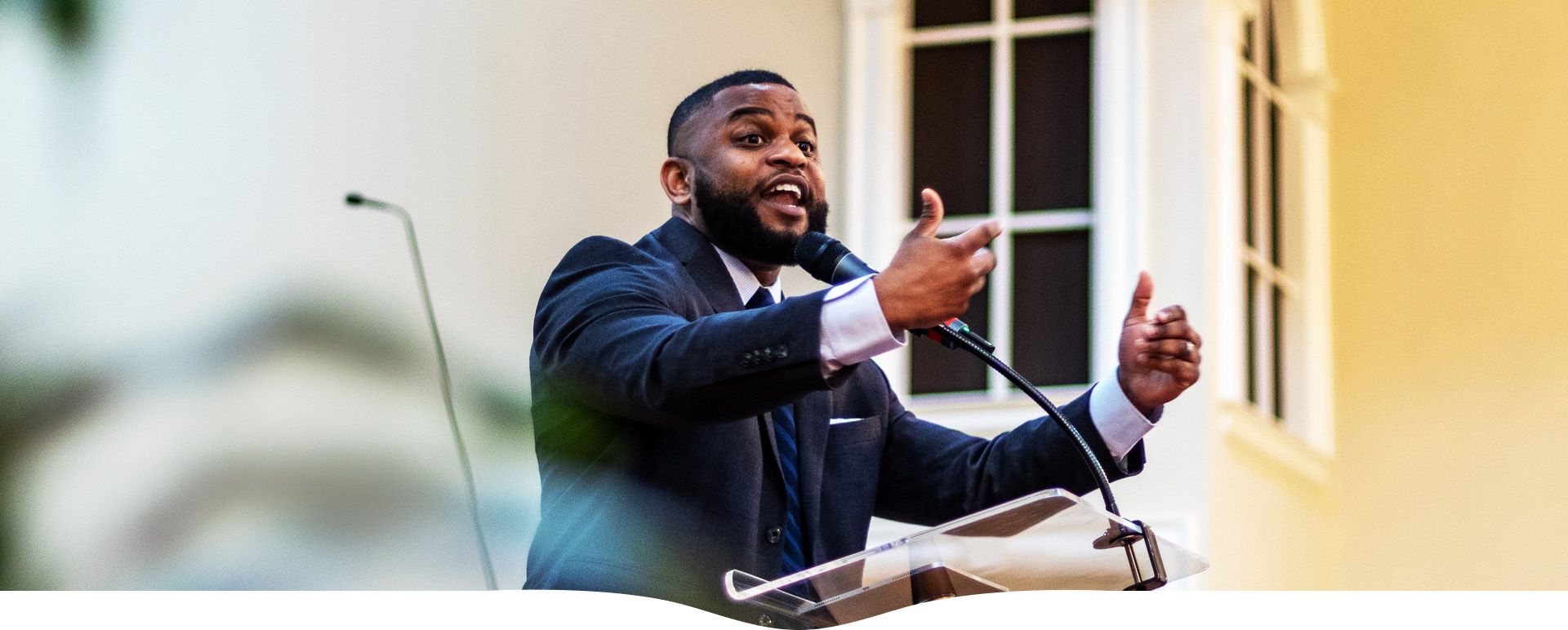
About First Church
First Baptist Church of Greater Washington Park (First Church) was begun in 1939 in a home owned by one of its founding deacons, Mr. Harry Johnson. He, along with Rev. J. S. Phifer, Deacon Burt Preeman, and Rev. Mitchell Friendly, worked to clean the home for worship services. Although there were very few members initially, through holy inspiration and an enduring faith, this small group of believers embraced the significance of their religious obligations, continuing to serve in the home of the Johnsons, until a tent was purchased, through the help of Mr. Jim Davis. As the small membership grew, the need for a building became apparent. To that end, on February 22, 1942, Rev. Phifer and Deacon Johnson sketched, on the back of a Gospel Voices Jubilee singing card, what would become the original church building. In time, the property of the Johnsons was purchased from Deacon Harry Johnson, and the foundation was laid for what would be a new church and place of worship. Since those humble beginnings, numerous programs, facilities, and various leaders have been at the helm of First Church, and countless individuals and families have been a part of our continual evolution and growth. Today, First Church is under the leadership of Pastor Leon Hampton, Jr., who was installed as new pastor on October 23, 2022.
Mission & Vision
We exist to help people encounter God, become disciples, discover themselves, and serve humanity.
Our vision is to see people saved, set free, made whole, empowered by the Holy Spirit and content in Christ.
What We Believe
The Bible is our all–sufficient rule for faith and practice. These Articles of Faith are a summary statement taken from the Bible of the foundational beliefs held by this Church.
The sole basis of all our belief is the Bible, God’s infallible, inerrant, written revelation of His Word. We believe that the scriptures, both the Old and the New Testament, are uniquely and fully inspired by the Holy Spirit, and serves as the supreme and final authority in all matters in which it speaks (II Timothy 3:15–17; I Thessalonians 2:13; II Peter 1:21).
There is one true and living God, the Creator of heaven and earth, eternally self-existent as three persons— Father, Son, and Holy Spirit—each of whom possesses equally all the attributes of deity and characteristics of personality (Deuteronomy 6:4; Isaiah 43:10, 11; Matthew 28:19, 20; Luke 3:22).
Jesus Christ is God incarnate, the Living Word (John 1:1–14), virgin born through the miraculous conception of the Holy Spirit (Matthew 1:23; Luke 1:31, 35). He lived a sinless life on earth (Hebrews 7:26, I Peter 2:22), and performed many undeniable miracles through the power of the Holy Spirit (Acts 2:22; 10:38). He voluntarily atoned for the sins of men by dying on the cross as their substitute, thus satisfying divine justice, reconciling men back unto God, and accomplishing salvation for all who trust in Him alone (Romans 5:8–11; I Corinthians 15:3; II Corinthians 15:3; II Corinthians 5:21). He rose from the dead in the same body, though glorified, in which He lived and died (Matthew 28:6; Luke 24:39; I Corinthians 15:4). He was exalted and ascended bodily into heaven to sit at the right hand of God the Father, where He, and He alone, is the only mediator between God and man, continually making intercession for those who believe in Him (Acts 1:9, 11; 2:33; Philippians 2:9–11; Hebrews 1:3).
Jesus Christ shall come again to the earth, personally, visibly, and bodily to establish His Kingdom. At this time, the dead in Christ shall be resurrected, the believer to eternal joy with the Lord, and the unbeliever to condemnation and eternal suffering (Acts 1:11; I Corinthians 15:51; Hebrews 9:28; I Thessalonians 4:16; Revelation 19:20; 20:11–15; 22:6–16; Matthew 25:46; Mark 9:43–48).
Man was originally created good and upright in the image of God. However, man by voluntary transgression, sinned by disobeying God. Thus, he alienated himself from God and experienced not only physical death, but also spiritual death. That historic fall brought all men under divine condemnation. Therefore, all men are born into a sin filled world with a sinful nature, totally unable to please God without regeneration, redemption, and renewal (Genesis 1:26, 27; 2:17; 3:6; Romans 3:23; 5:12-19).
Man’s only hope of redemption is through the shed blood of Jesus Christ, the Son of God. It is wholly the work of God’s free grace and is not the work, in whole or in part, of human works, goodness or religious ceremony (Ephesians 2:4–10). Salvation is received through repentance toward God and faith, toward the Lord Jesus Christ, by the regeneration and renewing of the Holy Spirit, being justified by grace through faith, man becomes an heir of God and a joint-heir with Jesus Christ, according to the hope of eternal life (Luke 24:47; John 3:1–21; Romans 10:13-15; Titus 2:11; 3:5–7). It is the privilege of all who are born again by the Holy Spirit to be assured of their salvation from the very moment they trust in and confess Jesus Christ as their Lord and Savior. This assurance is not based upon human merit but is produced by the witness of the Holy Spirit, who confirms in the believer the assurance of their salvation according to the testimony of God’s Word (Romans 8:35–39). The inward evidence of salvation is the direct witness of the Holy Spirit (Romans 8:16), and the outward evidence to all men is a life of righteousness and true holiness unto God (Ephesians 4:24; Romans 6:1–18; 8:1–9).
The Holy Spirit has come into the world to reveal and glorify Jesus Christ and to apply the saving work of Christ to men. He convicts and draws sinners to Christ, imparts new life unto them, seals them until the day of redemption, leads and aides them in a life of holiness unto God not fulfilling the lust of the flesh, and equips them for service and work in God’s Kingdom, bearing spiritual fruit unto the glory of God. Every believer is called to live under the power of the indwelling of the Holy Spirit and should ardently expect and earnestly seek the promise of the Father, the baptism of the Holy Spirit, according to the command of our Lord Jesus Christ (Luke 24:49; Acts 1:4–8; I Corinthians 12:1–31). With the baptism of the Holy Spirit comes an overflowing fullness of the Spirit (John 7:37- 39; Acts 4:8), a deepened reverence for God (Acts 2:43; Hebrews 12:28), an intensified consecration to God and dedication to His works (Acts 2:42), and a manifestation of the fruit and gifts of the Spirit (Galatians 5:16-26; Romans 12:3-9; I Corinthians 12:1–31).
Sanctification is an act of separation from that which is evil, and of dedication to God (Romans 12:1, 2; I Thessalonians 5:23; Hebrews 13:12). The Scriptures teach that the goal of believers is to pursue a life of “holiness without which no one can see God” (Hebrews 12:14). Through the power of the Holy Spirit, we are able to be obedient to God’s command: “Be ye holy, for I am holy” (I Peter 1:15, 16). Sanctification is the process whereby we are saved from the power of sin in our lives, through a commitment to the spiritual disciplines of prayer, daily devotions and worship, the study of God’s Word, and the fellowship of believers (Romans 6:1–13; Romans 8:1, 2, 13; Galatians 2:20; Philippians 2:12; I Peter 1:5).
The church is the body of Christ, the habitation of God through the Holy Spirit, with divine appointments for the fulfillment of her mission, to win the world for Christ. Jesus Christ is the head of the church, which is composed of all men, living and dead, who have been joined to Him through saving faith (Matthew 16:18; Ephesians 1:22, 23; 2:22; Hebrews 12:23). According to the Scriptures, the church exists to magnify and exalt God in worship, to train and instruct believers in their discipleship, to minister to the needs of its members and the world, to encourage and develop the Christian fellowship of its members, and to equip its members to evangelize the world and spread the Gospel of Jesus Christ (Acts 2:41–47).
There are two ordinances of the church—Baptism and Holy Communion. The ordinance of baptism by immersion is commanded in the Scriptures. All who repent and believe in Christ, as Savior and Lord, are to be baptized, as they are physically able, and have opportunity (Matthew 28:19, 20; Acts 8:26–38). Baptism is an outward sign of an inward spiritual renewal and rebirth. Thus, they who are baptized declare to the world that they have died with Christ and that they also have been raised with Him to walk in newness of life (Acts 10:47, 48; Romans 6:4). Holy Communion, also known as the Lord’s Supper, consisting of broken bread, the body of Jesus Christ, and the fruit of the vine, the shed blood of our Lord and Savior, is the symbol expressing our sharing the divine nature of our Lord Jesus Christ (II Peter 1:4); a memorial of His suffering and death (I Corinthians 11:26); our fellowship and communion with all believers (Ephesians 4:4–6); and our prophetic expectation of His second coming (I Corinthians 11:26). We accept these large areas of doctrinal teaching on which, historically, there has been general agreement among all true Christians. We desire to allow for freedom of conviction on doctrinal matters, provided that any interpretation is based on the Bible alone, and that no such interpretation shall become an issue, which hinders the ministry to which God has called us.
Our History
First Church
1939
First Baptist Church of Greater Washington Park (First Church) was established in 1939 on 4th Street, then moved into a home on Second Street, owned by one of its founding deacons, Mr. Harry Johnson, and his wife Mrs. Lily Johnson. He, along with Rev. J. S. Phifer, Deacon Burt Preeman, and Rev. Mitchell Friendly, worked to clean the home for worship services. Even though the members were few, they kept the faith and did not give up in despair. They realized the importance of their religious obligations and continued to worship through service. Our forefathers continued to serve in the house of the Johnsons until a tent was purchased through the help of Jim Davis.
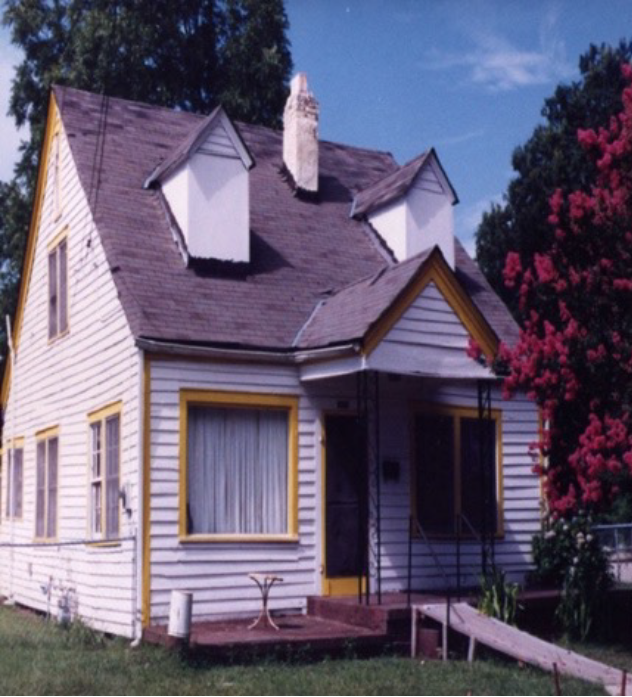
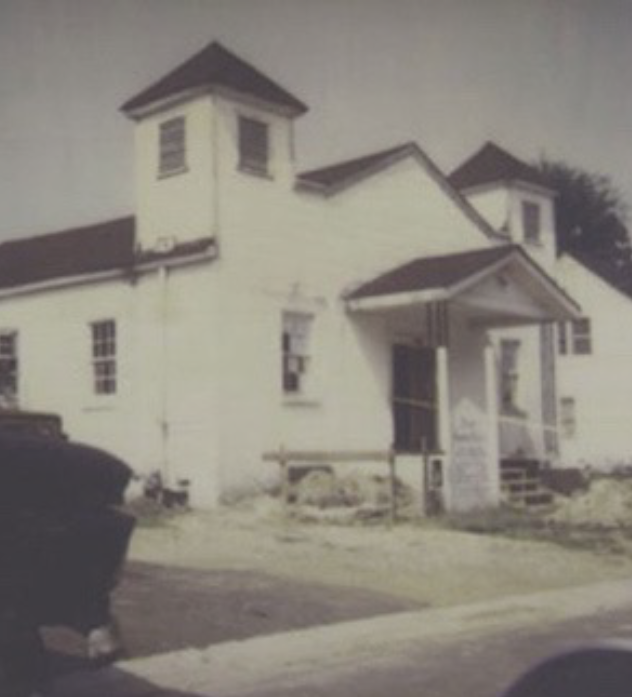
1942
As the members continued to grow, the need for a building came about. The original building was sketched on the back of a Gospel Voices Jubilee’s singing card on February 22, 1942, by Rev. Phifer and Deacon Johnson. Afterwards, the property was purchased from Deacon Harry Johnson’s uncle and the foundation was laid.
1986-88
In 1986, renovations began on what was the original, white church, which included bricking the building. This was also the year that the Mass Choir was formed. During this time, it was an all-hands-on deck approach to getting the church completed and prepped for its first service in the newly renovated facility. As the story goes, one member, Mrs. Cora Thomas (who was married to Deacon John Thomas, whose father was also a minister at First Church, the Rev. Joe Thomas) at that time was working at a local department store. The church members worked with her to purchase new drapery for the sanctuary, which was used to cover the brown wooden blinds on the windows. Drapery was also hung in the choir stand to make a backdrop, which gave the impression of a faux window. From the pastor to lay members, many were involved in getting the church readied for its debut in 1988, which is the year the cornerstone was laid, the second one was laid in 1994 on Third Street.
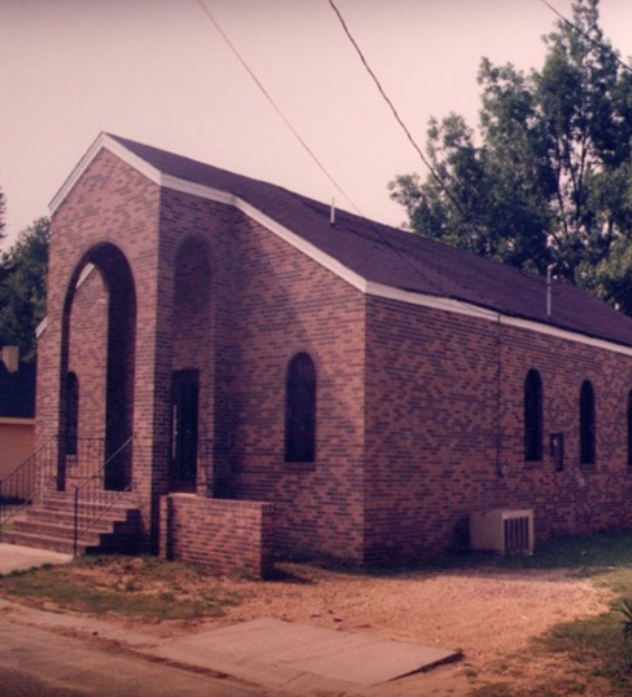
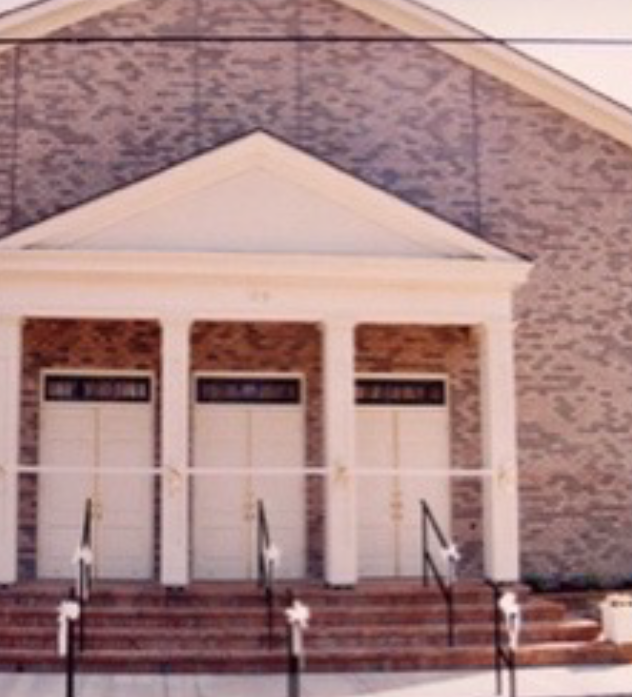
1994
Over the years, numerous programs, facilities, and various leaders have been at the helm of First Church, and countless individuals and families have been a part of our continual evolution and growth. Most notably, in 1985, Dr. Willie Welch, III, was elected as pastor of First Church. He was installed in March of 1986, and served faithfully until 2021, for a total of 36 years. During his tenure, First Church moved from Second Street to the present Third Street edifice, which was valued at $1Million.
2022
Today, First Church is under the leadership of Pastor Leon Hampton, Jr., who was installed as the new pastor on October 23, 2022.
